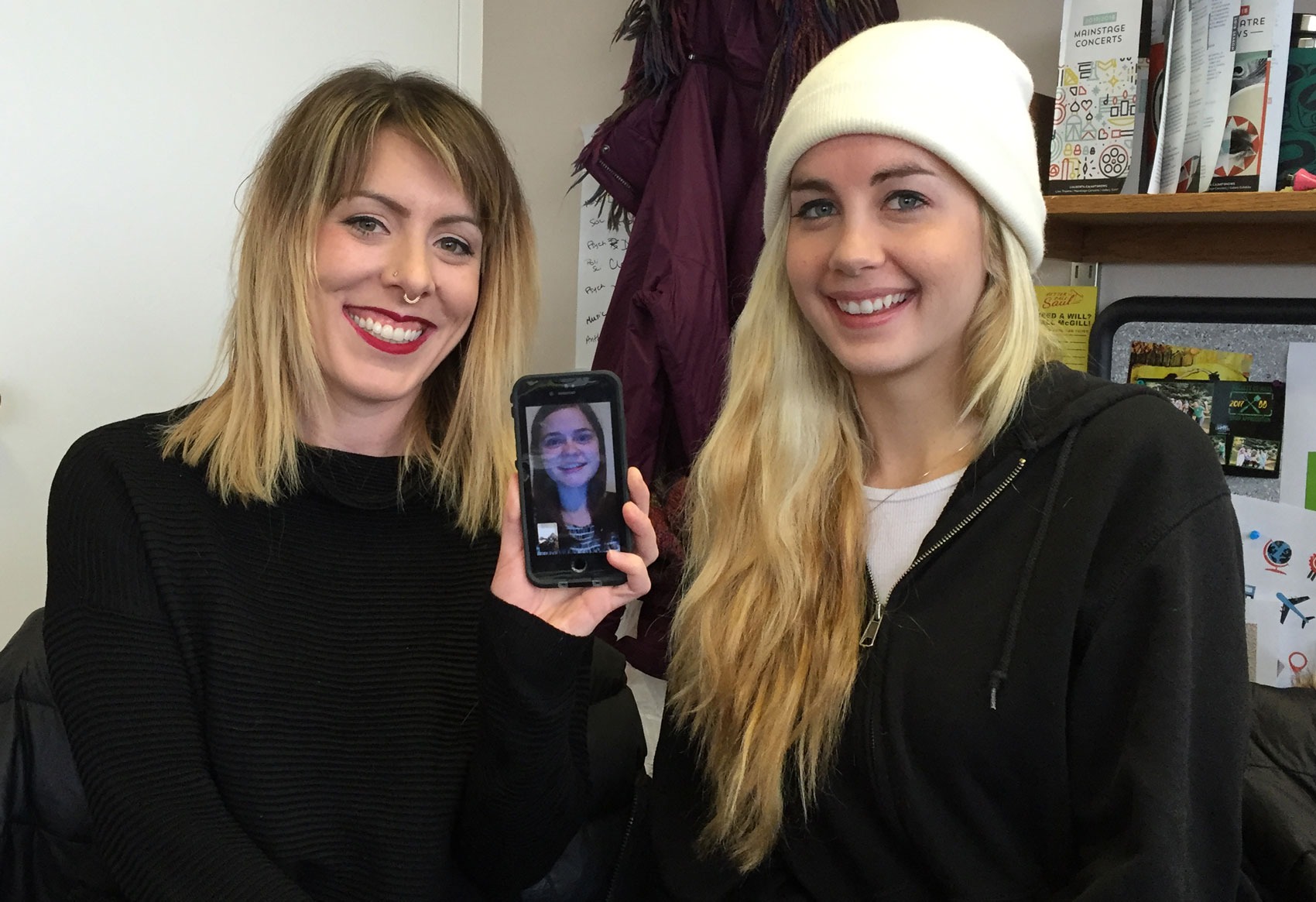
Lynsey Race, Megan Stewart (on device), and Megan Perram
The first graduates of The Department of Women's and Gender Studies' new MA in Gender and Social Justice come from diverse educational backgrounds but share a passion for advocating on behalf of positive social change. All three course-based students - Lynsey Race, Megan Perram and Megan Stewart - were drawn to the program because of its unique cross-disciplinary and collaborative approach to research at the intersections of gender.
Lynsey Race entered the program focused on how the state governs families, but a class on prison abolitionism with Chloe Taylor helped to refine her interest to vulnerable and marginalized types of motherhood. This resulted in Race's capstone project, "Mother-Child Units in Prison: Disciplining the 'Unworthy' Mother."
"There isn't a ton of information out there on this, so I think it's a really important subject," says Race. "Especially when we're talking about Indigenous women, who are the fastest growing prison population in Canada. That's a huge concern, especially in light of the TRC [Truth and Reconciliation Commission of Canada]."
Megan Perram is interested in health care, but her area of research focused on a specific group of women who are living with Polycystic Ovary Syndrome (PCOS), a condition that occurs when a female body produces too much testosterone.
Her project, "Soul Cysters dot net: Configuring the Feminine Body Through the Life Writing of Women with Polycystic Ovarian Syndrome," looked at an online forum where women with PCOS come together to talk about their disorder, medications and the different forms of treatment.
"I wanted to look at how these women came to understand themselves and construct their identities as having a PCOS body, and how they are using alternative media formats to do this," says Perram. "There seems to be a general collective rejection of normative health care and a move towards online spaces to deal with their disorders."
Megan Stewart used her own experiences as a Community Service-Learning (CSL) student as a point of reference for her capstone project, "Dialoguing for Discovery: Students as Knowledge Producers." Stewart looked at the efficacy of CSL as an agent of social justice, not just for those who receive their services from community organizations, but also for the student participants.
"I think an important part of that is listening to the students' voices and integrating student voice into the classroom as a tool for learning, not just having the instructor as the only source of authority."
Race, Perram and Stewart say that courses in women's and gender studies inspired an interest in social justice, although none received her undergraduate degree from the program.
Race, a graduate of the governance and public policy studies program at Athabasca University, came to the Department of Women's and Gender Studies via a transfer from the political science department.
"I had taken a class from Chloe Taylor in my undergrad as a visiting student," she says. "I knew this program was in the works, and the timing worked out. It's a much better fit!"
Perram received her undergraduate degree from political science, but identifies her minor in film studies as the catalyst for deepening her feminist education. "I fell in love with it," she says. "I got to explore a lot of feminism and feminist theory, and so I started taking more women's studies courses."
Stewart had a similar experience. "I took a women's and gender studies 100-level course and it totally changed how I thought and analyzed information. I carried that through my undergrad in sociology where there is a lot of overlap, but that foundational course I took early on is part of the reason why I chose the MA in Gender and Social Justice."
All three agree that this area of focus is unique to the UAlberta campus, capturing the social justice thread that runs through so many disciplines within the university and in society in general. Though still a comparatively small degree program - there were a total of seven students in the inaugural class (the four thesis-based students are set to graduate in 2018) - the long-standing collaborative and cross-disciplinary nature of Women's and Gender Studies Department is, according to all three, a big part of the success of its new graduate program.
"The diversity of projects for such a small group is huge," says Race, now enrolled in the Occupational Therapy program. "I mean, just look at the three of us, and it was just like that with everyone else in our cohort. It's really cool to see the different projects that have come out of this."
Perram, who is currently working as an intern with UAlberta's Integrative Health Institute, agrees. "You really can come in with any research interest and make it fit, because social justice and gender studies are relevant everywhere. You don't have to shift what you're passionate about."
Related reading:
Read more about the MA in Gender and Social Justice programhere.
Read about the Department of Women's and Gender Studies' 30th Anniversaryhere.